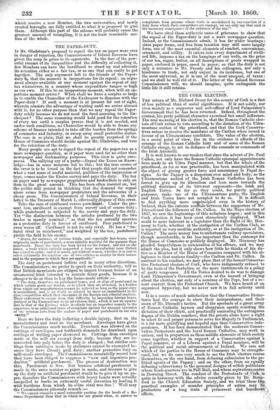THE CORK ELECTION.
THE return of Mr. Richard Deasy for the county of Cork is a fact of less political than of social significance. It is not solely, nor
even mainly as a supporter and sub-officer of Lord Palmerston's Government that he has been returned. Indeed, throughout the contest, his party political character exercised but small influence. The real meaning of his election is, that the Roman Catholic elec- tors of Cork refuse to vote according to the dictation of the Ultra- montane section of the priesthood, and that the Cork Conserva- tives refuse to receive the mandates of the Carlton when issued in favour of an Ultramontane candidate. The value of the election, in a social point of view, lies in the evidence it affords of the courage of the Roman Catholic laity and of some of the Roman Catholic clergy, to act in defiance of the counsels or commands of the Irish Antonelli.
It is well known to our readers that since the advent of Dr. Paul Cullen, not only have the Roman Catholic episcopal appointments been made in an Ultra Papal manner, but that the whole of the priesthood, as far as was practicable, has been manipulated with the object of giving greater force and consistency to Papal de- signs. As the Papacy is a despotism over mind and body, so the Ultramontane section of the Irish Roman Catholics lias been forced to give up its liberalism and lean more towards the political doctrines of its bitterest opponents—the Irish and English Tories. So far as they could, for purely political purposes, make use of the Ultramontane party, the English and Irish Tories have not scrupled to do so. It is difficult to find anything more unkrincipled even in the history of Ireland, than the entente cordiale between the supporters of Mr. Disraeli and the followers of Dr. Cullen. In the Mayo election of 1857, we saw the beginnings of this nefarious league ; and in this Cork election it has been most shamelessly displayed. What could be more indecent in a legislator than the flight of Mr. Hen- nessy to Cork, whether at the instigation of the Carlton Club, as is reported on very credible authority, or at the instigation of Dr. Cullen ? The mere money loss to unfortunate railway speculators, though considerable, is far less important than the contempt for the House of Commons so publicly displayed. Mr. Hennessy has pleaded forgetfulness in extenuation of his offence and we may admit the plea, but it only shows how little he thinks of his du- ties as a Member of the House of Commons compared with his al- legiance to that curious duality—the Carlton and Dr. Cullen. In contrast to his conduct, we may place that of the honest Conserva- tive Protestant electors of Cork, who have indignantly refused to be the tools of the Derbyites, or the mere instruments in a policy of party vengeance. All the Tories desired to do was to damage Lord Palmerston's Government, even at the hazard of bringing about the election, not only of a nominee of the Pope, but of a re- cent convert from the Protestant Church. We have heard of an organized hypocrisy, but we never saw it in full activity until now.
It is a source of much satisfaction that the Conservative Protes- tants had the courage to show their independence, and their scorn of Mr. Disraeli's tactics. But the spectacle of a great array of Roman Catholic laymen and clergymen openly resisting the dictation of their chiefs, and practically contesting the outrageous dogma of the Dublin conclave, that the priests alone have a right to select fit and proper persons to serve her Majesty in Parliament, is a far more gratifying and hopeful sign than Conservative inde- pendence. It has been demonstrated that the moderate Conser- vative Protestants and the loyal Roman Catholics, may work in unison, and in proportion as these middle elements of Irish society come iogether, whether in support of a 'Conservative against a Papal nominee, or of a Liberal against a Papal nominee, will be the political and social advancement of Ireland. We care not which of the parties in the House of Commons may be strength- ened, but we do care very much to see the Irish electors rescue themselves, on the one hand, from debasing submission to the po- litical agents of the Papacy ; and on the other, from an Kindly debasing subserviency to the personal designs of selfish politicians whose head-quarters are in Pall Mall, and whose aspirations centre in Downing Street. The conduct of the Protestants. of,Cork, is quite in harmony with the advice recently given by Vr. Beres- ford to the Church Education Society, and we trust'these two practical examples of sounder principles of action may bre productive of a long train of permanent slid beneficent effects.


























 Previous page
Previous page